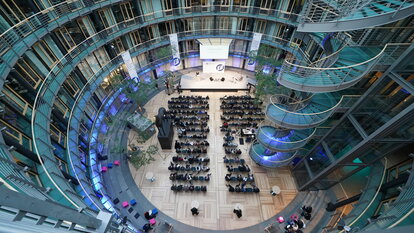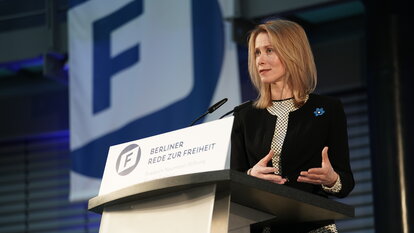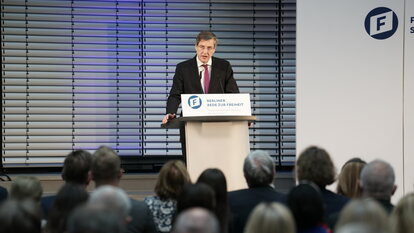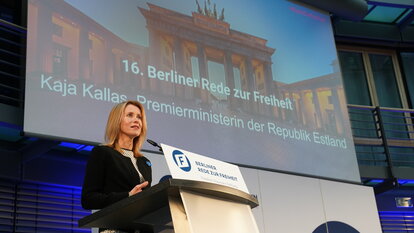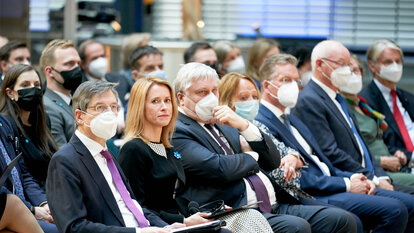Kaja Kallas, Estonia’s first female prime minister, has become one of Europe’s leading voices against Russia’s war of aggression in Ukraine. She has been instrumental in getting the EU to take tougher action against Russia.
She linked her 16th Berlin Freedom Speech to an appeal to formulate an even stronger European response to Putin’s barbaric war of aggression. To prevent further aggression, she said, the West must act appropriately. For Kaja Kallas, this represents a long-term task to be anchored in a new policy toward Russia. She herself calls this policy “intelligent containment.”
This means continuing to support Ukraine’s struggle for freedom while increasing pressure on the Russian aggressor through further sanctions and political and economic isolation. She calls for the West to take a big leap forward in terms of its own defense. Read the full Freedom Speech by Kaja Kallas here:
Dear Guests, Dear Friends
I am honored to be here today. I was in Berlin for the first time in 1988 as an eleven-year old. Perestroika had begun and for me it was a miracle that we could go to East Germany, a foreign country. My father took me along with my brother to as close to the Brandenburg Gate as possible to have a look at the Wall. I vividly recall him saying: “Kids, breathe in deeply – that’s the air of freedom that comes from the other side.”
At the time, I didn’t completely understand what he meant. It is said that you only appreciate freedom when it’s taken from you. But as a child born under Soviet occupation, I never had experienced freedom. Soon enough, a wind of change began to blow, tearing down the Wall in Berlin as well as elsewhere in Europe. And I was able to breathe this air of freedom at home.
When Estonia managed to get out of the totalitarian prison in 1991, 30 years ago, I was a teenager. What was a turn, die Wende, for you was a revolution for us. After regaining independence and freedom Estonia had a difficult task: to build a free and open society, a parliamentary democracy. This was not an easy task – despite relief that people were finally free.
Re-establishing a democratic relationship between the citizen and the state is not something you do overnight and it is nothing you can learn from books. Our way to freedom was accompanied and supported by many friends from the free world. Here Germany had a special leadership and support. Allow me to make some links in this regard.After the collapse of the Soviet Union we first had to rapidly establish a new social contract and anchor this agreement in our constitution.
While drafting our Constitution in 1992, Roman Herzog, President of the Federal Constitutional Court at that time, was an expert drafting the chapter on fundamental freedoms, rights and duties – in fact, the proportion of this chapter speaks for itself as it amounts to more than quarter of the whole text.The German legal system formed the foundation while re-establishing central parts of our private, criminal and general administrative law.
This also means that a whole generation of Estonian lawyers, myself included, studies German legal practice. Moreover, it is German Rechtstheorie that forms the basis of an introductory class of first-year law students in Estonia.
Another milestone on our road to freedom was monetary reform carried out by my father Siim Kallas. Free Estonia had to have its own money – in 1992 the Estonian kroon was re-introduced. With the blessing of the Bundesbank, we tied the Estonian kroon to the German Mark – the most suitable anchor currency which provided an additional guarantee to our own currency’s stability. This monetary reform is considered by the IMF to be one of the most successful in its history.
Ladies and Gentlemen,
Russian aggression against Ukraine has forced us to think about what freedom means for each and every one of us. And how fragile it may be. And what it takes to safeguard it. At this dark hour in Europe, the importance of keeping our own democratic house in order is more acute than ever. We need to take care of the democratic relationship between the citizen and the state.
As much as it is the individual responsibility of every citizen to care for democracy, it is the leaders who are responsible for keeping the rights of individuals and the rule of law at the center of governance.
Leaders must also safeguard strong institutions in support of it. This is often not self-evident. Attacks on democratic institutions are on the rise – from within our own democracies as well as from outside. And a Rechtsstaat with strong institutions is important, however, not sufficient for safeguarding the freedom from an outright aggressor.
I speak to you here in Berlin when the regime in the Kremlin is destroying its neighbor Ukraine and tries to conquer the second largest country by area in Europe. It is only 1400 km from here that Russia is shelling a European capital.
When I was breathing in the air of freedom back in 1988, both Estonians and Ukrainians were on the wrong (evil) side of the wall. Today, the Kremlin tries to build another wall to divide Europe and this time Estonia is lucky enough to be at the free side. The same cannot be said for Ukraine. Times like these make us look back to brave decisions in our past. I praise the decision-making courage of our leaders and those of the free world who made it possible for so many Central and Eastern European countries to reintegrate rapidly with Europe.
Speaker of our erstwhile parliament, the Supreme Council of Estonia, Ülo Nugis said already in 1991: “As political and historical experience has shown, neutrality did not guarantee our security. This may not guarantee our security even today, especially in view of the possible processes in the Soviet Union.”
He said it in reference to the 1930s when the young Estonian republic tried to balance between two evil empires and war machines. This ended with losing our statehood for 50 years. Hence, it was only natural that in the 1990s our foreign and security policy focus was set on joining EU and NATO. We wanted never to be alone again.
The free world, including Germany, played a key role in restoring our country and place on the world map. And it is no secret that to many, the weight and boldness of those decisions at that time have only become apparent now while witnessing Russian aggression against Ukraine. Current dangerous and tragic times also reveal how democracy matters. And how liberties and freedoms matter.
Why is Russia fighting the war in Ukraine? It started when Ukraine chose its democratic path. Russia does not want freedom and democracy to prevail. It is direct threat to dictatorship. Because in democracy 1) governments err and are held accountable at elections; 2) state should deliver for the people and not for the dictator or its cronies.
When we look at Russia we see darkness – fear is keeping its society together. And we see thousands fleeing from tyranny. We know this fear. Fear of secret police who seize people in the middle of the night or arrest them only for holding up placards in public squares, fear of the constant distrust, fear to express your opinion, fear of the atrocities that might follow.
Tens of thousands of Estonians fled this same tyranny after World War Two. While Ukrainians are defending the freedom they have built, the Russian killing machine wishes and I cite: “to change the bloody and false consciousness of a part of today’s Ukrainians”. These are the words of Dmitry Medvedev.
The Kremlin and Putin have made it clear by their statements that their aim is to wipe Ukraine off the world map. “Denazification” is the official Russian label of this policy of destruction of the Ukrainian state and its people. The word “Nazi” is used to justify its aggression and genocidal and fascist policies.
How is this possible? I say that history matters. Although the Soviet Union collapsed, its imperialist ideology never did. While our history books were rewritten after the collapse of the Soviet Union, this was not the case in Russia. While the crimes of Nazism have been unequivocally condemned, this has not been done with the crimes of Communism.
Instead, Putin has built a strong revival of Stalinism and as a result the opinion polls suggest that 70 percent of Russians approve of Stalin and his policies. If people admire dictators, there is no moral obstacle to becoming one or submitting to one.
The warning signs were there: imperial nostalgia, in fact Russia kept the Soviet anthem, the narrative of Russian victimhood combined with heavy anti-Western propaganda while closing down free media. And we witnessed Putin’s wars in Chechnya, Georgia, Donbas and Crimea. Looking back to the past signs, a return to war and aggression seems inevitable. There is a clear pattern in Russia´s road to totalitarianism.
This road to tyranny is symbolically captured by the man who was recently arrested in Moscow for standing on the street holding Tolstoy’s book “War and Peace”. The past Putin´s wars illustrate why he must not win this one and why Moscow cannot be allowed to pretend that it has gained anything in the process.
We have let Putin get away with aggression several times before. We can’t let him get away with it again now. Were that to happen, his appetite would only grow, and more atrocities and more human suffering would follow.
Putin’s strategic aims have not changed. The suffering and devastation in Ukraine is far from over. Ukrainian Prime Minister Denis Shmyhal says: If Russia stops fighting, there will be peace. If Ukraine stops fighting, there will be no Ukraine. We have reached the moment where we should have courage to say: Ukraine must win this war. And we must act accordingly. Freedom must be armed better than tyranny.
Dear Listeners
We are in this for the long haul and we need to hardwire these profound changes into a long-term new policy vis-à-vis Russia. I have labelled it as a Policy of Smart Containment. That means we need to continue support Ukraine’s fight for freedom, while building up pressure against aggressor with further sanctions and political and economic isolation.
This also means that we need to make a huge leap forward when it comes to our own defence. NATO´s defence in the Baltic Sea region needs a substantial change. We need significantly more combat-ready troops stationed in the Baltic States, more fighter-jets in our skies and ships in the Baltic Sea.
We also need to have a very clear understanding – Putin and all of those who have committed war crimes have to know that their judgment day will come. It is clear that after all these atrocities there should be no way back to business as usual with Putin´s Russia.
In fact, there should be no business at all. Russia should have no seat at the table of international organisations and bodies that are based on the respect of international law. It’s high time for everyone to use their moral compass. The Kremlin needs to feel it is isolated.
Free world should follow the motto: “When the facts change, I change my mind”. We have seen huge and historic turnarounds. Also here in Germany. However, as long as this aggression is not stopped, we have not done enough. One of our main focus should be on drying up the Kremlin´s war machine –revenues from hydrocarbons lie at the heart of it.
I understand the difficult choices leaders in democracies face today. I understand that rising inflation — in particular a surge in the cost of energy — could mean that economic difficulties at home overshadow the suffering of Ukrainians. Gas might be expensive, but freedom is priceless. It’s up to every government to decide how much of the burden its people are ready to carry.
But it is equally necessary we get the message through to our people – what is our neighbor’s problem today will be our problem tomorrow. We are in danger, when our neighbor’s house is on fire.
Let me conclude with warning words by Russian dissident and chess world champion Garry Kasparov and I quote: “The price of stopping a dictator always goes up with every delay and every hesitation. Meeting evil halfway is still a victory for evil.” End of quote.
Hitting the right balance with policy is understandably one of the biggest challenges for democracies and for our freedom today. Were this war to be lost, it would be not lost by Ukraine but us.
We know that goodness always triumphs over evil. This is also my life experience. While standing here now and breathing in deeply, that is the same freedom I was breathing in as an 11-year-old here in 1988. And if we do everything to help Ukraine, there will be no 11-year-olds for whom the air of freedom is something they only experience from a distance.
Thank you!




